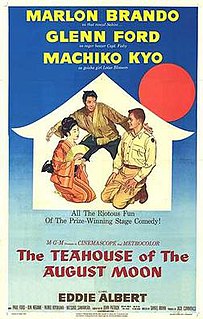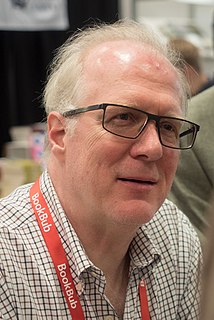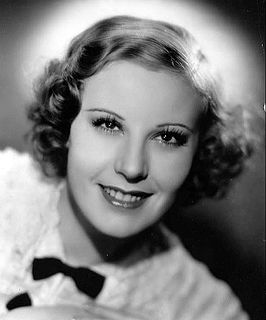The Teahouse of the August Moon (Play) Book Review
The Teahouse of the August Moon (play)
Concluding updated| The Teahouse of the August Moon | |
|---|---|
| Written by | Vern Sneider (novel) John Patrick (play) |
| Characters | Captain Fisby Sakini Col. Wainright Purdy 3 Helm McLean Mr. Oshira Lotus Blossom The Daughter's Child Mr. Sumata Mr. Sumata's Male parent Aboriginal Human Sergeant Gregovich Villagers |
| Date premiered | 15October1953 (1953-10-xv) |
| Place premiered | Martin Beck Theatre New York City, New York |
| Original language | English |
| Genre | One-act |
| Setting | Japan |
The Teahouse of the Baronial Moon is a 1953 play written by John Patrick adjusted from the 1951 novel by Vern Sneider. The play was later on adjusted for picture show in 1956, and the 1970 Broadway musical Lovely Ladies, Kind Gentlemen .
- Plot summary
- Productions
- Awards and nominations
- Adaptations
- Further reading
- References
- External links
The play opened on Broadway in October 1953. It was a Broadway hit, running for 1,027 performances and winning awards including the New York Drama Critics Circumvolve Accolade for Best American Play of the Twelvemonth, the Pulitzer Prize in Drama, and the Tony Honor. The play, well regarded for several decades, came to seem old-fashioned with increased agreement and sensitivity of racial issues. The portrayals of the Okinawa characters in the play were seen as offensive, and the generational sense of humor began to lose its touch on in the 1970s.
Plot summary
In the aftermath of World War II, the island of Okinawa was occupied by the American war machine. Captain Fisby, a immature army officeholder, is transferred to a tiny Okinawa isle boondocks chosen Tobiki by his commanding officer, Colonel Purdy. Fisby is tasked with the job of implementing "Program B". The program calls for teaching the natives all things American and the start step for Capt. Fisby is to establish a democratically elected mayor, chief of agriculture, chief of constabulary, and president of the Ladies League for Democratic Activeness. Plan "B" also calls for the edifice of a schoolhouse (Pentagon shaped), democracy lessons, and establishing capitalism through means left up to the expert captain's judgment. A local Tobiki native, Sakini past name, is assigned to act equally Fisby's interpreter. Sakini, a Puck-like character, attempts to accustom Fisby with the local customs likewise as guide the audiences through the play, providing both historical and cultural framework through his asides and monologues.

Subsequently receiving many gifts from the villagers, including a geisha named Lotus Flower, Fisby tries to notice local products on which to build his capitalist try. He is discouraged when the villagers can non notice a market for their handmade products, items like geta (wooden sandals), lacquered bowls, cricket cages, and casas (straw hats). He is also frustrated when the newly elected democratic government votes to build a teahouse (ochaya) for Lotus Blossom with the building supplies designated for his Pentagon-shaped school. Through the villagers, Helm Fisby starts to see the dazzler of preserving their culture and a slower fashion of life. He agrees to build the teahouse and even lands on a moneymaking product – sweet white potato brandy. Soon the Cooperative Brewing Company of Tobiki is churning out liquor past the gallon and selling it to all the neighboring military machine bases.
The gala opening of the teahouse is the moment when Colonel Purdy decides to make his progress inspection and finds Helm Fisby serenading the villagers in his bathrobe with a rendition of "She'll Be Coming Round the Mountain". He is in danger of court martial and reprimanded for misusing government supplies, selling liquor and "not turning the villagers into Americans fast enough". Col. Purdy orders the destruction of all the stills and the teahouse. Sakini and the villagers outsmart the colonel and only pretend to destroy everything, instead hiding everything "quick equally the dickens". Their foresight proves fortuitous when Purdy learns that Congress is about to use Tobiki as a model for the success of Programme B. The villagers rebuild the teahouse on stage, and even offer a cup to Col. Purdy in a gesture of goodwill. Like all bang-up comedies, in the end, all is forgiven. The village returns to the rich life they in one case knew (plus a teahouse, consign industry, and geishas), Fisby is touted a hero, and Purdy, we hope volition get a brigadier full general'south star for his wife Grace afterward all.
Ready in the time-frame of the backwash of World War 2 and U.S. occupation of the Japanese islands, Teahouse of the August Moon is a comedy whose laughs come from the inability of the American characters to understand Tobiki civilisation and tradition. However, it is non just a story of culture clash. Through the character of Fisby, we run across acceptance and the beauty of making peace with oneself somewhere between ambition and limitations. We also larn, like Fisby, that sometimes the better life is had by taking a "footstep backward in the right direction".
Productions
The Teahouse of the Baronial Moon premiered on Broadway at the Martin Brook Theatre on October fifteen, 1953 and closed on March 24, 1956 after 1,027 performances. [1] Directed by Robert Lewis, the cast featured John Forsythe (Capt. Fisby), David Wayne (Sakini), Paul Ford (Col. Wainright Purdy Iii), Larry Gates (Capt. McLean), William Hansen (Mr. Oshira), and Mariko Niki (Lotus Blossom). [ane] Hawaiian-American composer Dai-Keong Lee created incidental music for the production, and actor Yuki Shimoda is credited with choreographing and providing "Japanese coaching." [ii]
The two touring productions were headed by Burgess Meredith and Larry Parks in the role of Sakini. [3] In April 1954, The Teahouse of the August Moon was produced in Okinawa as a fundraiser to build schools, with members of the U.Due south. occupying forces and citizens of Okinawa in the cast. [4] The play was produced in Vienna and Berlin every bit Das Kleine Teehaus and in Mexico Urban center as La Casa de Té de la Luna de Agosto, translated by Mexican playwright Rodolfo Usigli. [five]
New York's Pan Asian Rep revived Teahouse in 2000, directed by Ron Nakahara. [6]
Awards and nominations
Sources: PlaybillVault [1]
- 1954 Tony Awards
- All-time Play—winner
- Actor in a Play, David Wayne—winner
- Author of a Play—winner
- Producer of a Play—winner
- Scenic Design of a Play, Peter Larkin—winner
- 1954 New York Drama Critics' Circle—Best American Play, winner
- 1954 Pulitzer Prize for Drama [vii]
Adaptations
John Patrick adapted his play for the 1956 moving picture The Teahouse of the August Moon , starring Glenn Ford, Eddie Albert, Marlon Brando, and Machiko Kyo. The play and screenplay were adapted for the 1970 Broadway musical Lovely Ladies, Kind Gentlemen .
Farther reading
- Sneider, Vern J. (1951). The Teahouse of the August Moon . New York: Putnam. OCLC 429098.
Related Research Articles

Edward Franklin Albee III was an American playwright known for works such as The Zoo Story (1958), The Sandbox (1959), Who's Afraid of Virginia Woolf? (1962), A Delicate Residuum (1966), and Three Tall Women (1994). Some critics have argued that some of his work constitutes an American variant of what Martin Esslin identified and named the Theater of the Absurd. Three of his plays won the Pulitzer Prize for Drama, and two of his other works won the Tony Award for Best Play.

Richard Purdy Wilbur was an American poet and literary translator. I of the foremost poets of his generation, Wilbur's work, composed primarily in traditional forms, was marked by its wit, charm, and gentlemanly elegance. He was appointed the 2d Poet Laureate Consultant in Poesy to the Library of Congress in 1987 and received the Pulitzer Prize for Poesy twice, in 1957 and 1989.

Donald Margulies is an American playwright and Professor (Adjunct) of English language and Theater & Performance Studies at Yale University. In 2000, he received the Pulitzer Prize for Drama for his play Dinner with Friends.

The Teahouse of the Baronial Moon is a 1956 American one-act film directed by Daniel Isle of mann and starring Marlon Brando. Information technology satirizes the U.S. occupation and Americanization of the isle of Okinawa following the end of World State of war Two in 1945.
John Patrick was an American playwright and screenwriter.

Machiko Kyō was a Japanese actress who was agile primarily in the 1950s.

David Wayne was an American phase and screen actor with a career spanning over 50 years.

Mary Coyle Hunt was an American journalist, playwright and children'southward novelist, known primarily for writing the 1944 Broadway play Harvey, which was adapted into the 1950 picture show starring Jimmy Stewart.

Morris Ankrum was an American radio, television, and film graphic symbol histrion.
Kenneth Nelson was an American actor.

The Astor Theatre was located at 1537 Broadway, at West 45th Street in Times Square in New York City. It opened September 21, 1906, with Shakespeare's A Midsummer Night's Dream and continued to operate as a Broadway theatre until 1925. From 1925 until it closed in 1972, information technology was a first-run cinema.
John Cummings was an American film producer and director. He was best known for being a leading producer at MGM. He was the second husband of Betty Kern, daughter of Jerome Kern.

Tracy S. Letts is an American thespian, playwright, and screenwriter. He received the Pulitzer Prize for Drama and the Tony Award for Best Play for his production, August: Osage Canton (2007), and the Tony Award for All-time Thespian in a Play for his portrayal of George in the revival of Who'southward Afraid of Virginia Woolf? (2013).
Lovely Ladies, Kind Gentlemen is a musical with a book by John Patrick and music and lyrics by Stan Freeman and Franklin Underwood.

Rosita Díaz Gimeno was a Spanish stage and film actress from Madrid. She was 5' tall, with reddish hair, and brown eyes. She weighed ninety-viii pounds.
Stanley Freeman was an American composer, pianist, lyricist, musical arranger, conductor, and studio musician.

The Teahouse of the August Moon is a novel by Vern Sneider published in 1951. The volume subsequently was adapted for a play (1953) and picture show (1956) with the same titles, both written by John Patrick, and later in 1970, the Broadway musical Lovely Ladies, Kind Gentlemen by Patrick and Stan Freeman. It depicts the activities of U.S. Army armed services regime officers and personnel in occupied Okinawa following World War Two. The novel was republished in 2018 past Camphor Press.
The Teahouse of the Baronial Moon may refer to:
Vernon J. Sneider was an American novelist. His 1951 novel The Teahouse of the August Moon was later on adjusted for a Broadway play in 1953, a motion pic in 1956, and the Broadway musical Lovely Ladies, Kind Gentlemen in 1970. John Patrick 'south play The Teahouse of the August Moon won the Pulitzer Prize in Drama in 1954.
Franklin Underwood, as well known equally Frank Underwood during the 1960s, is an American songwriter and jazz pianist. Underwood lives in Manhattan. His show Lovely Ladies, Kind Gentlemen, a musical based on The Teahouse of the Baronial Moon with Stan Freeman opened on Broadway in 1970. His credits include songs for Rod Warren'due south 1964 Chicago revue The Game Is Up, and "I Wish I'd Met You" sung by Lena Horne and Sammy Davis, Jr. with music by Johnny Mandel and lyrics past Richard Rodney Bennett and Frank Underwood. Other songs include "Real Men Don't Eat Quiche".
References
- 1 ii 3 "'The Teahouse of the Baronial Moon' Broadway 1953" playbillvault.com, accessed December 18, 2015
- ↑ Schildcrout, Jordan (2019). In the Long Run: A Cultural History of Broadway'south Hit Plays. New York and London: Routledge. pp.120–21. ISBN 978-0367210908.
- ↑ Schildcrout, p. 122.
- ↑ Schildcrout, p. 122.
- ↑ Schildcrout, pp. 122-23.
- ↑ Schildcrout, p. 124.
- ↑ "Pulitzer Prize for Drama" pulitzer.org, accessed december xviii, 2015
External links
- The Teahouse of the August Moon at the Cyberspace Broadway Database
- The Teahouse of the August Moon at the Internet Broadway Database
- The Teahouse of the August Moon (1956 film) at IMDb
- Lovely Ladies, Kind Gentlemen (1970 musical) at the Internet Broadway Database
- John Patrick. The Teahouse of the Baronial Moon. Dramatists Play Service Inc. New York: 1952
- "The Teahouse of the Baronial Moon: Introduction." Drama for Students. Ed. Marie Rose Napierkowski. Vol. 13. Detroit: Gale, 1998. eNotes.com. January 2006. 4 May 2009. <http://world wide web.enotes.com/teahouse-baronial/introduction>.
This page is based on this Wikipedia article
Text is available under the CC BY-SA 4.0 license; boosted terms may use.
Images, videos and audio are available under their respective licenses.
Source: https://wikimili.com/en/The_Teahouse_of_the_August_Moon_(play)
0 Response to "The Teahouse of the August Moon (Play) Book Review"
Post a Comment